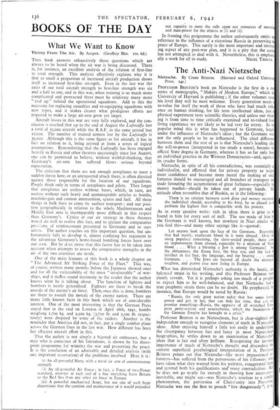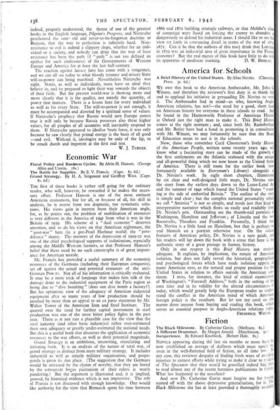The Anti-Nazi Nietzsche
PROFESSOR BRINTON'S book on Nietzsche is the first in a n series of monographs, " Makers of Modern Europe," which th University of Harvard is publishing ; if the other volumes react his level they will be most welcome. Every generation' needs re-value for itself the work of those who have had much infla ence on human thinking, for life tests intellectual ideas, just as physical experiment tests scientific theories, and unless our think. ing is from time to time critically examined and re-valued hoe living experience we are likely to be led very far astray. In th popular mind this is what has happened to Germany, largely under the influence of Nietzsche's ideas ; but the Germans wen not the only people to be so influenced. The chief difference between them and the rest of us is that Nietzsche's leading idea, the will-to-power (interpreted in too crude a sense), became the official State dogma in Germany, whereas it has so far only been an individual practice in the Western Democracies—and, again, it its cruder forms.
Nietzsche, in spite of all his contradictions, was essentially individualist, and affirmed that for private property to insp more confidence and become more moral the making of smal fortunes should be encouraged and all branches of transport and trade favouring the accumulation of great foftunes—especially th money market—should be taken out of private hands. His attitude often resembles that of Ruskin, as in the following: There is no relation between work done and money received; the individual should, according to his kind, be so placed as
perform the highest that is compatible with his powers.
As in every creative writer rich in ideas there is grist to it found in him for every sort of mill. The use made of him'''. the Germans is well known, but nowhere in Nazi circles val you find this—and many other sayings like it—quoted: Let anyone look upon the face of the Germans. Everything that had manly, exuberant blood in it went abroad. Over tit smug populace remaining, the slave-souled people, there came an improvement from abroad, especially by a mixture of Slats blood. . . . What a blessing a Jew is among Germans! So the obtuseness, the flaxen hair, the blue eye, and the lack d
intellect in the face, the language, and the bearing . anion! Germans. . . . The Jews are beyond all doubt the strongea toughest, and purest race now living in Europe.
What has diminished Nietzsche's authority is the hectic, un- balanced strain in his writing, and this Professor Brinton vet! clearly reveals. Yet it is perhaps asking too much of a prophet to expect him to be well-balanced, and that Nietzsche had 3 true prophetic strain there can be no doubt. He prophesied, b( instance, that Europe would be saved by Russia: "Russia, the only great nation today that has some lasso, power and grit in her, that can bide her time, that can std promise something—Russia, the opposite of all wretched Eta. pean petty-statism and neurasthenia, which the foundation d the German Empire has brought to a crisis."
Professor Brinton is no Nietzschean, but is clear-sighted and independent enough to recognise elements of truth in Nietzsches ideas. After enjoying himself a little too easily in underlining the discrepancy between fact and fancy in most Nietzschea biographies, he settles down to an examination of Nietzsche's ideas that is fair and often- brilliant. Recognising' the intrinsic importance of much of Nietzsche's thought and discarding the current superficial psychological interpretation of it, Profess( Brinton points out that Nietzsche—like most impassioned rc" formers—has suffered from the perversions of his followers. who have taken what they wanted from his yvritings, exaggerated them and ignored both his qualifications and' many contradiction. But he does not go nearly far enough in showing how necessan'r inevitable, one might say—was Nietzsche's reaction to a sirnof phenomenon, the perversion of Christ' anity into Passivism: Nietzsche was not the first to preach "live dangerously'';it is' indeed, .properly understood, the theme of one of the greatest books in the English language, Pilgrim's Progress, and Nietzsche proclaimed the sam- old and never-to-be-forgotten doctrine as Bunyan, that the way to perfection is infinitely hard. Non- resistance to evil is indeed a slippery _slope, whether for an indi- vidual or a society, and nobody can deny that the way of least resistance has been the path (if " path " is not too- defined an epithet for such aimlessness) of the Governments of Western Europe and America for at least the last half-century. The reaction against laissez faire has come with a vengeance, and we can all see today to what bloody tyranny and misery State ,will-to-power can bring mankind. .Nevertheless Nietzsche was right. States, as well as individuals, must have an ideal they believe in, and he prepared to fight their way towards the objects of their faith. But the present world-war is showing more and more clearly that it is the quality, not merely the quantity, of power that matters. There is a lesson here for every individual as well as for every State. The will-to-power is not enough, it must be accompanied and directed by a spiritual sense of values. If Nietzsche's prophecy that Russia would save Europe comes true it will only be because Russia possesses also these higher values, for all peoples of all countries will inevitably respond to them. If Nietzsche appeared to idealise brute force, it was only because he saw clearly that primal energy is the basis of all good —and evil. Without it, ideologies may be only of the lip, to be struck dumb and impotent at the first real test.
W. J. TURNER.



























 Previous page
Previous page